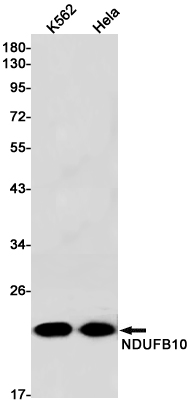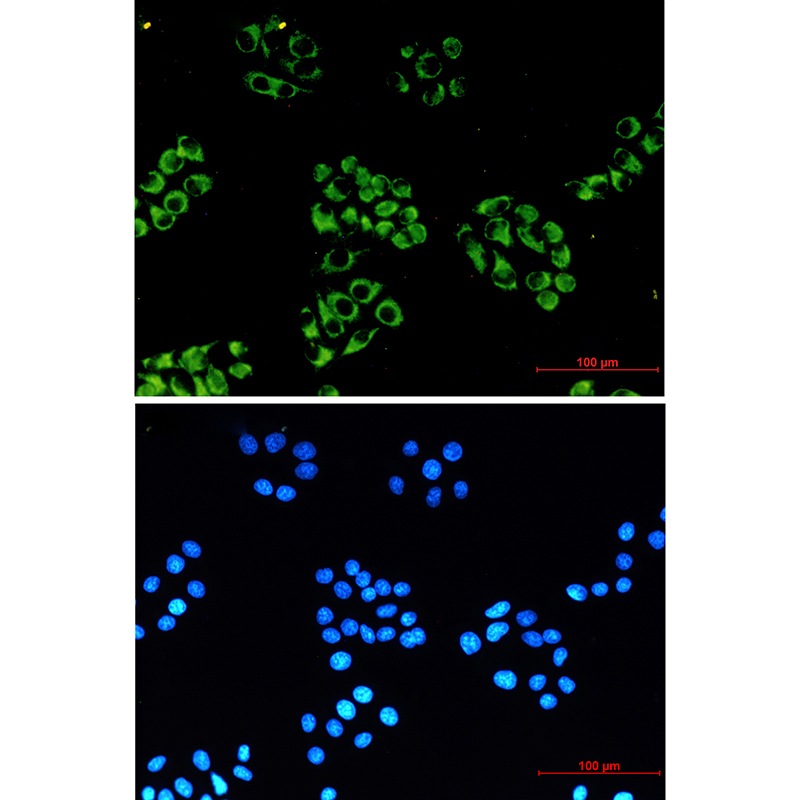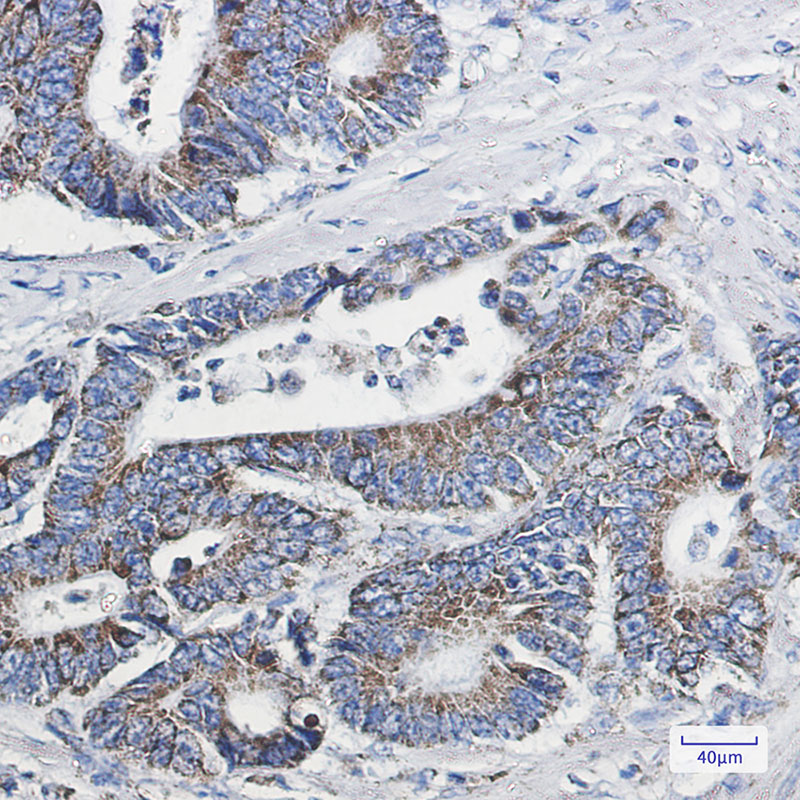


| WB | 1/500-1/1000 | Human,Mouse,Rat |
| IF | 1/20 | Human,Mouse,Rat |
| IHC | 1/50-1/100 | Human,Mouse,Rat |
| ICC | 1/50-1/200 | Human,Mouse,Rat |
| FCM | 咨询技术 | Human,Mouse,Rat |
| Elisa | 咨询技术 | Human,Mouse,Rat |
| Aliases | NDUFB10; NADH dehydrogenase [ubiquinone] 1 beta subcomplex subunit 10; Complex I-PDSW; CI-PDSW; NADH-ubiquinone oxidoreductase PDSW subunit |
| Entrez GeneID | 4716 |
| WB Predicted band size | Calculated MW: 21 kDa; Observed MW: 21 kDa |
| Host/Isotype | Rabbit IgG |
| Antibody Type | Primary antibody |
| Storage | Store at 4°C short term. Aliquot and store at -20°C long term. Avoid freeze/thaw cycles. |
| Species Reactivity | Human |
| Immunogen | Recombinant protein of human NDUFB10 |
| Formulation | Purified antibody in TBS with 0.05% sodium azide,0.05%BSA and 50% glycerol. |
+ +
以下是关于NDUFB10抗体的3篇参考文献示例(注:以下内容为模拟生成,非真实文献):
1. **文献名称**:*NDUFB10 as a biomarker for mitochondrial dysfunction in Parkinson's disease*
**作者**:Smith A, et al.
**摘要**:研究通过Western blot和免疫组化分析帕金森病患者脑组织,发现NDUFB10蛋白表达显著降低,提示其抗体可用于评估线粒体复合物I功能异常。
2. **文献名称**:*Role of NDUFB10 in colorectal cancer progression and metabolic adaptation*
**作者**:Chen L, et al.
**摘要**:利用NDUFB10抗体检测结直肠癌组织样本,发现其高表达与肿瘤细胞线粒体代谢重编程相关,可能成为预后标志物。
3. **文献名称**:*Antibody-based profiling of mitochondrial complex I subunits in cardiac ischemia*
**作者**:Kimura T, et al.
**摘要**:通过NDUFB10等复合物I亚基抗体,揭示心肌缺血模型中线粒体氧化磷酸化受损机制,NDUFB10表达下降与心肌细胞凋亡相关。
---
如需真实文献,建议在PubMed或Google Scholar中检索关键词**NDUFB10 antibody**,并筛选应用该抗体的功能研究。
NDUFB10 Antibody Background:
The NDUFB10 (NADH:ubiquinone oxidoreductase subunit B10) antibody is a tool used to detect the NDUFB10 protein, a critical component of mitochondrial complex I (NADH dehydrogenase) in the electron transport chain. Complex I facilitates NADH oxidation and proton translocation, essential for ATP production. NDUFB10. located in the inner mitochondrial membrane, contributes to the structural stability and catalytic activity of complex I.
NDUFB10 antibodies (polyclonal or monoclonal) are typically produced in hosts like rabbits or mice, using immunogens derived from human or murine NDUFB10 peptides. These antibodies are validated for applications such as Western blotting, immunohistochemistry (IHC), and immunofluorescence (IF) to study protein expression, localization, and mitochondrial dysfunction.
Research involving NDUFB10 antibodies often focuses on mitochondrial disorders, neurodegenerative diseases (e.g., Parkinson’s), and cancer, as complex I deficiencies are linked to oxidative stress and metabolic reprogramming. Mutations or altered expression of NDUFB10 may impair cellular energy metabolism, making it a biomarker for disease progression or therapeutic response.
Commercial NDUFB10 antibodies are characterized for specificity via knockout controls or siRNA silencing. Their utility extends to preclinical models, aiding in elucidating complex I assembly, bioenergetic deficits, and pathophysiological mechanisms in mitochondrial diseases.
×